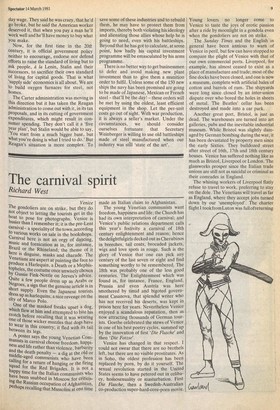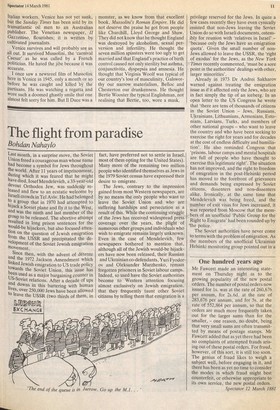The carnival spirit
Richard West
Venice
The gondoliers are on strike, but they do not object to letting the tourists get in the boat to pose for photographs. Venice is busier than I remember it; it is the pre-Lent carnivala speciality of the town ,according to various works on sale in the bookshops. Carnival here is not an orgy of dancing, music and fornication as in, for instance, Brazil or the Rhineland; the theme of it here is disguise, masks and charade. The Venetians are expert at painting the face to produce a Harlequin, a Death or a Mephistopheles, the costume once unwisely chosen by Gussie Fink-Nottle on Jeeves's advice. Quite a few people dress up as Arabs or Negroes, a sign that the genuine article is in short supply. Even the Japanese tourists dress up as harlequins; a nice revenge on the City of Marco Polo. One of the masked freaks upset_ a dog, Which flew at him and attempted to bite his crotch before recalling that it was wearing one of those wicker muzzles that dogs have to wear in this country; it fled with its tail between its legs. A poster says the young Venetian Communists in carnival choose freedom, happiness and life rather than violence, barbarity and the death penalty — a dig at the old or middle-aged communists who have been calling for a return of hanging or the firing Squad for the Red Brigades. It is not a happy time for the Italian communists who have been snubbed in Moscow for criticising the Russian occupation of Afghanistan, Perhaps recalling that Mussolini at one time made an Italian claim to Afghanistan.
The young Venetian communists want freedom, happiness and life; the Church has had its own interpretation of carnival; and Venice's public relations department calls this year's festivity a carnival of 18th century enlightenment and reason; hence the delightful girls decked out as Cherubi nos in breeches, tail coats, brocaded jackets, wigs and love spots in rouge. Such is the glory of Venice that one can pick any century of the last seven or eight and find something worthy to be remembered. The 18th was probably one of the less good centuries. The Enlightenment which was found in, for instance, France, England, Prussia and even Austria was here smothered by timid and bigoted government Casanova, that splendid writer who has not received his deserts, was kept in prison here for years. Nevertheless Venice enjoyed a scandalous reputation, then as now attracting thousands of German tourists. Goethe celebrated the stews of Venice in one of his best poetry cycles, summed up by the innovation of first 'Die Flasche' and then `Die Fotzse'.
Venice has changed in that respect. I could not swear that there are no brothels left, but there are no visible prostitutes. As in Soho, the oldest profession has been replaced by porn, by do it yourself. The sexual revolution started in the United States seems to have petered out in celibacy, homosexuality or masturbation. First Die Flasche, then a Swedish-Australian co-production super-hard-core-porn movie. Young lovers no longer come to Venice to taste the joys of erotic passion after a ride by moonlight in a gondola even when the gondoliers are not on strike.
The Sunday Times and the English in general have been anxious to warn of Venice in peril, but few can have stopped to compare the plight of Venice with that of our own commercial ports. Liverpool, for example, has almost ceased to exist as a place of manufacture and trade; most of the fine docks have been closed, and one is now a museum, complete with artificial bales of cotton and barrels of rum. The shipyards were long since closed by an inter-union dispute over who bored the holes in sheets of metal. The Beatles' cellar has been destroyed and made into a car park.
Another great port, Bristol, is just as dead. The warehouses are turned into art galleries, pubs and the inevitable industrial museum. While Bristol was slightly damaged by German bombing during the war, it has been devastated by property men since the early Sixties. They bulldozed street after street of 16th, 17th and 18th century houses. Venice has suffered nothing like as much as Bristol, Liverpool or London. The glassworks prosper since the Italian trade unions are still not as suicidal or criminal as their comrades in England.
The whining workers of Liverpool flatly refuse to travel to work, preferring to stay on the dole. The Venetians will travel as far as England, where they accept jobs turned down by our 'unemployed'. The charter flight I took from Luton was full of returning Italian workers. Venice has not yet sunk, but the Sunday Times has been sold by its transatlantic oil men to an Australian publisher. The Venetian newspaper, II Gazzettino, flourishes; it is written by cultivated journalists. • Venice survives and will probably see us all out. It survived Mussolini, the 'carnival Caesar' as he was called by a French Politician. He hated the jibe because it was accurate.
I once saw a newsreel film of Mussolini here in Venice in 1945, only a month or so before he was caught and killed by the partisans. He was watching a regatta and wore such a doomed ghastly smile that one almost felt sorry for him. But Il Duce was a monster, as we know from that excellent book, Mussolini's Roman Empire. He did not deserve the praise he got from people like Churchill, Lloyd George and Shaw. They did not know that he thought England was destroyed by alcoholism, sexual perversion and infertility. lie thought the seven million spinsters were too ugly to get married and that England's practice of birth control caused not only sterility but asthma, conjunctivitis, dyspepsia and amnesia. He thought that Virginia Woolf was typical of our country's loss of masculinity, Galsworthy our narrow materialism, Belloc and Chesterton our drunkenness. He thought Bertie Wooster the typical Englishman, not realising that Bertie, too, wore a mask.







































 Previous page
Previous page